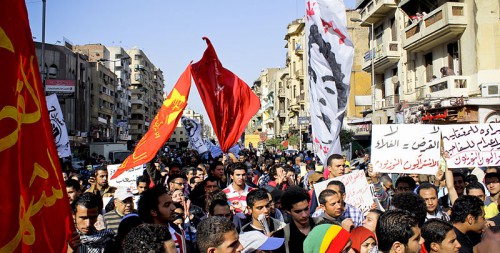Gherardo Astaldi Journal Staff
Once again Egyptians are out in the streets. Two years after Mubarak’s Egyptian regime collapse and glimpses of a democratic government were underway, current President Muhammad Morsi is decreasing hopeful expectations that had inspired and captured the hearts and visions of many, over an optimistic future of change and prosperity.
Since the elected Muslim Brotherhood party has seemingly failed to establish democratic measures and is now seeking increasingly more power, the peoples’ unanimous strive to achieve Egypt’s freedom is still vibrant and represents an escape from the country’s totalitarian past. Thousands of people are currently protesting in the streets against the party’s intent to seek authority and lay the foundations to a regime strikingly analogous to the previous one.
Muhammad Morsi is failing in many ways to arouse the country’s uncontrolled desire to strive towards democratic political ideals. As the weekly journal The Economist reported “Mr. Morsi should present himself as president of all Egyptians, whatever they think Islam should play in public life. He should also improve the police and the courts by slowly trying to instill democratic values.”
This civil uproar seems more anarchic and vengeful than the revolution in 2011. This is mostly the case because the government has not enacted the promises that the people have waited so long for. Additionally, the riots are leading the country to further economic distress and towards a second revolution. Chances are that the people will overthrow the president and call up for new elections. Either President Muhammad Morsi embraces new diplomatic measures of openness to increase his nation’s economy or he will have to face civil outrage.
Tahir Square, the main center where the first demonstrations began, is yet again filled with protestors and demonstrators opposing the government’s decisions.
The newly drafted constitution includes a particular interpretation of Islamic law, which, according to the opposition, raises fears over totalitarian measures that the Brotherhood might want to use in order to gain control over the population.
The Brotherhood seems to be strikingly similar to the political conception of “Big Brother” described in George Orwell’s novel, 1984. A distant entity that ensures happiness and freedom yet annihilates the population’s mindfulness of independent ideas and rules. A loving government body that the population describes as a caregiver and affectionate family member, who, on the contrary, savagely brainwashes the civilians’ understanding of reality.
Egypt’s problem lies in its constitution and its increase in the government’s individual power. The constitution must be rephrased to give people experience a true democracy. As State Department official Victoria Nuland said, “One of the aspirations of the revolution was to ensure that power would not be overly concentrated in the hands of any one person or institution.”
Additionally, in referring to the constitution, she also said that “the current constitutional vacuum in Egypt can only be resolved by the adoption of a constitution that includes checks and balances, and respects fundamental freedoms, individual rights and the rule of law consistent with Egypt’s international commitments.” Since the people are endlessly striving for individual freedom, government leaders around the world believe the nation will eventually escape this vacuum of repression and eventually endorse the just values of a democratic governance.













The Suffolk Journal • Feb 13, 2013 at 6:00 pm
[International] Protests revived over regime in Egypt:http://t.co/ayuTR8gQ